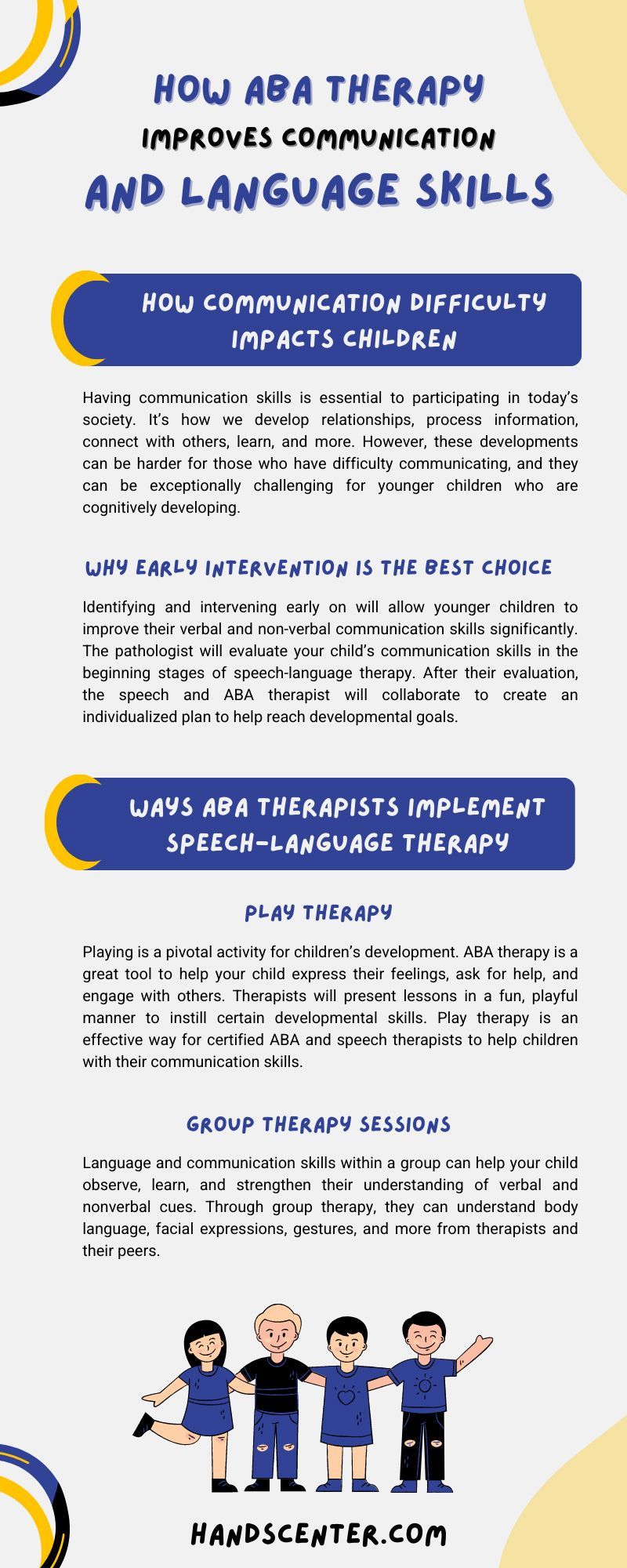How ABA Therapy Improves Communication and Language Skills
A common symptom and sign in children with autism is difficulty communicating with others. This can be picked up as early as nine months of age. Therefore, improving language and communication skills in children with autism is a common priority among parents, caregivers, and therapists.
While communication deficits look different in every child, ABA therapy helps children overcome barriers and develop life-fulling skills. With an individualized plan, your child can learn verbal and nonverbal techniques to help communicate their needs and wants or tell a story. They can excel in other developmental skills by honing their language and communication skills.
At HANDS, we want to see our children thrive. In this article, we will explain how early intervention and ABA therapy improve communication and language skills. Keep reading to learn how to support your child with autism best.
How Communication Difficulty Impacts Children
Having communication skills is essential to participating in today’s society. It’s how we develop relationships, process information, connect with others, learn, and more. However, these developments can be harder for those who have difficulty communicating, and they can be exceptionally challenging for younger children who are cognitively developing.
Without proper treatment and intervention, children with communication difficulties often experience challenges in school, as they struggle to socialize with others, verbally express their needs, read, and write. Understanding and supporting your child’s unique needs can help them fulfill various developmental skills.
Why Early Intervention Is the Best Choice
If you have a child with autism, you will know that early intervention is the best choice for any new venture and skill. The best way to ensure long-term outcomes is by starting at a younger age. Therapists can address these difficulties in these therapy sessions before they become routine.
Identifying and intervening early on will allow younger children to improve their verbal and non-verbal communication skills significantly. The pathologist will evaluate your child’s communication skills in the beginning stages of speech-language therapy. After their evaluation, the speech and ABA therapist will collaborate to create an individualized plan to help reach developmental goals.
Your child’s plan will include short and long-term goals that work toward advancing spoken language and nonverbal communication skills. These goals often include mastering the following:
- Basic communicative gestures
- Sign language
- Communicating via drawing
- Communicating via photos
- Using technology to communicate
Ways ABA Therapists Implement Speech-Language Therapy
The best way to ensure your child gets the proper direction is by enrolling them in an ABA therapy center. ABA and speech-language therapists work together to build a comprehensive lesson plan to help target areas of improvement. With these individualized goals, therapists can closely work with learners to address their needs. Below are a few ways professionals implement speech-language therapy in their applied behavior analysis lessons.
Play Therapy
Playing is a pivotal activity for children’s development. ABA therapy is a great tool to help your child express their feelings, ask for help, and engage with others. Therapists will present lessons in a fun, playful manner to instill certain developmental skills. Play therapy is an effective way for certified ABA and speech therapists to help children with their communication skills.
Play therapy helps children strengthen their nonverbal cues and turn-taking skills. During these sessions, children will learn how to “read” facial expressions and model them. These lessons will help build their communication skills and forge friendships and relationships with siblings and parents.
Group Therapy Sessions
Language and communication skills within a group can help your child observe, learn, and strengthen their understanding of verbal and nonverbal cues. Through group therapy, they can understand body language, facial expressions, gestures, and more from therapists and their peers. ABA and speech therapists will encourage them to engage in play to help form friendships, improve eye contact, and handle conflict. This way, your child can use these skills at school, home, and other environments.
Practicing Communication Skills
ABA and speech therapists will work hard to strengthen your child’s ability to convey their needs and emotions. Your child can feel more comfortable expressing themselves by reducing avoidance and escaping behaviors and improving eye contact. ABA therapy can improve communication and language skills through:
- Repetition and routine
- Vocal imitation
- Copying motor movements
- Understanding facial expressions
- Interpreting body language
- Responding to questions or statements
How Parents Can Support Their Child at Home
Parents and caregivers play a major role in a child’s development outside of ABA and speech therapy. Therapists encourage professionals to train parents and caregivers to implement lessons and skills at home. Practicing in environments outside of the therapy center will increase the chances of your child using the skills on their own. Using these techniques beyond the therapy center can help them excel in school, develop friendships, and allow them to express themselves effectively. You can help your child strengthen their communication and language skills by implementing a few key strategies. These include:
- Playing games or setting up playdates
- Mimicking your child’s behavior and sounds
- Focusing on nonverbal cues
- Allowing room for your child to talk
- Simplifying your language
- Implementing visual supports
Consider Your Child’s Interests
Considering their interests is an excellent way to help encourage communication and language development. Whether they’re into dinosaurs, cars, animals, or musicals, talking to them about their favorite topic can help them engage more. Remember to keep your language simple and allow them time to respond. It would be best to consider using assistive devices to help foster development.
If you’re searching for ABA therapy in North Carolina, allow us to assist you. HANDS Center is 100 percent dedicated to our learners. We incorporate the expertise of a talented team of ABA therapists, occupational therapists, speech therapists, and counselors to develop the best plan for your child. Through these plans, we can exceed goals and address any challenges. We also offer training for parents and caregivers to give them the necessary tools to support their children in reaching their full potential—allowing them to have a fulfilling life.
Contact us today to learn more about our program so that we can help you and your child succeed.







